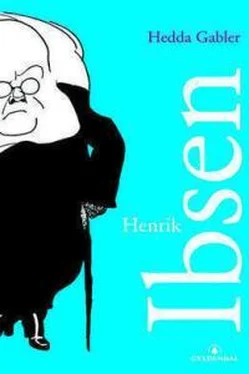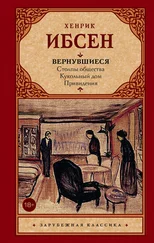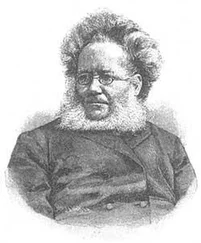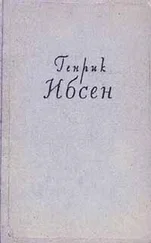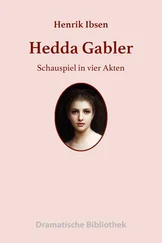Hedda Gabler
Henrik Ibsen
From Munich, on June 29, 1890, Ibsen wrote to the Swedish poet, Count Carl Soilsky: "Our intention has all along been to spend the summer in the Tyrol again. But circumstances are against our doing so. I am at present engaged upon a new dramatic work, which for several reasons has made very slow progress, and I do not leave Munich until I can take with me the completed first draft. There is little or no prospect of my being able to complete it in July." Ibsen did not leave Munich at all that season. On October 30 he wrote: "At present I am utterly engrossed in a new play. Not one leisure hour have I had for several months." Three weeks later (November 20) he wrote to his French translator, Count Prozor: "My new play is finished; the manuscript went off to Copenhagen the day before yesterday…. It produces a curious feeling of emptiness to be thus suddenly separated from a work which has occupied one's time and thoughts for several months, to the exclusion of all else. But it is a good thing, too, to have done with it. The constant intercourse with the fictitious personages was beginning to make me quite nervous." To the same correspondent he wrote on December 4: "The title of the play is Hedda Gabler . My intention in giving it this name was to indicate that Hedda, as a personality, is to be regarded rather as her father's daughter than as her husband's wife. It was not my desire to deal in this play with so–called problems. What I principally wanted to do was to depict human beings, human emotions, and human destinies, upon a groundwork of certain of the social conditions and principles of the present day."
So far we read the history of the play in the official "Correspondence." [1] Letters 214, 216, 217, 219.
Some interesting glimpses into the poet's moods during the period between the completion of The Lady from the Sea and the publication of Hedda Gabler are to be found in the series of letters to Fraulein Emilie Bardach, of Vienna, published by Dr. George Brandes. [2] In the Ibsen volume of Die Literatur (Berlin).
This young lady Ibsen met at Gossensass in the Tyrol in the autumn of 1889. The record of their brief friendship belongs to the history of The Master Builder rather than to that of Hedda Gabler , but the allusions to his work in his letters to her during the winter of 1889 demand some examination.
So early as October 7, 1889, he writes to her: "A new poem begins to dawn in me. I will execute it this winter, and try to transfer to it the bright atmosphere of the summer. But I feel that it will end in sadness—such is my nature." Was this "dawning" poem Hedda Gabler ? Or was it rather The Master Builder that was germinating in his mind? Who shall say? The latter hypothesis seems the more probable, for it is hard to believe that at any stage in the incubation of Hedda Gabler he can have conceived it as even beginning in gaiety. A week later, however, he appears to have made up his mind that the time had not come for the poetic utilisation of his recent experiences. He writes on October 15: "Here I sit as usual at my writing–table. Now I would fain work, but am unable to. My fancy, indeed, is very active. But it always wanders away ours. I cannot repress my summer memories—nor do I wish to. I live through my experience again and again and yet again. To transmute it all into a poem, I find, in the meantime, impossible." Clearly, then, he felt that his imagination ought to have been engaged on some theme having no relation to his summer experiences—the theme, no doubt, of Hedda Gabler . In his next letter, dated October 29, he writes: "Do not be troubled because I cannot, in the meantime, create ( dichten ). In reality I am for ever creating, or, at any rate, dreaming of something which, when in the fulness of time it ripens, will reveal itself as a creation ( Dichtung )." On November 19 he says: "I am very busily occupied with preparations for my new poem. I sit almost the whole day at my writing–table. Go out only in the evening for a little while." The five following letters contain no allusion to the play; but on September 18, 1890, he wrote: "My wife and son are at present at Riva, on the Lake of Garda, and will probably remain there until the middle of October, or even longer. Thus I am quite alone here, and cannot get away. The new play on which I am at present engaged will probably not be ready until November, though I sit at my writing–table daily, and almost the whole day long."
Here ends the history of Hedda Gabler , so far as the poet's letters carry us. Its hard clear outlines, and perhaps somewhat bleak atmosphere, seem to have resulted from a sort of reaction against the sentimental "dreamery" begotten of his Gossensass experiences. He sought refuge in the chill materialism of Hedda from the ardent transcendentalism of Hilda, whom he already heard knocking at the door. He was not yet in the mood to deal with her on the plane of poetry. [3] Dr. Julius Elias ( Neue deutsche Rundschau , December 1906, p. 1462) makes the curious assertion that the character of Thea Elvsted was in part borrowed from this "Gossensasser Hildetypus." It is hard to see how even Gibes' ingenuity could distil from the same flower two such different essences as Thea and Hilda.
Hedda Gabler was published in Copenhagen on December 16, 1890. This was the first of Ibsen's plays to be translated from proof–sheets and published in England and America almost simultaneously with its first appearance in Scandinavia. The earliest theatrical performance took place at the Residenz Theater, Munich, on the last day of January 1891, in the presence of the poet, Frau Conrad–Ramlo playing the title–part. The Lessing Theater, Berlin, followed suit on February 10. Not till February 25 was the play seen in Copenhagen, with Fru Hennings as Hedda. On the following night it was given for the first time in Christiania, the Norwegian Hedda being Froken Constance Bruun. It was this production which the poet saw when he visited the Christiania Theater for the first time after his return to Norway, August 28, 1891. It would take pages to give even the baldest list of the productions and revivals of Hedda Gabler in Scandinavia and Germany, where it has always ranked among Ibsen's most popular works. The admirable production of the play by Miss Elizabeth Robins and Miss Marion Lea, at the Vaudeville Theatre, London, April 20, 1891, may rank as the second great step towards the popularisation of Ibsen in England, the first being the Charrington–Achurch production of A Doll's House in 1889. Miss Robins afterwards repeated her fine performance of Hedda many times, in London, in the English provinces, and in New York. The character has also been acted in London by Eleonora Duse, and as I write (March, 5, 1907) by Mrs. Patrick Campbell, at the Court Theatre. In Australia and America, Hedda has frequently been acted by Miss Nance O'Neill and other actresses—quite recently by a Russian actress, Madame Alla Nazimova, who (playing in English) seems to have made a notable success both in this part and in Nora. The first French Hedda Gabler was Mlle. Marthe Brandes, who played the part at the Vaudeville Theatre, Paris, on December 17, 1891, the performance being introduced by a lecture by M. Jules Lemaitre. In Holland, in Italy, in Russia, the play has been acted times without number. In short (as might easily have been foretold) it has rivalled A Doll's House in world–wide popularity.
It has been suggested, [4] See article by Herman Bang in Neue deutsche Rundschau , December 1906, p. 1495.
I think without sufficient ground, that Ibsen deliberately conceived
Читать дальше
